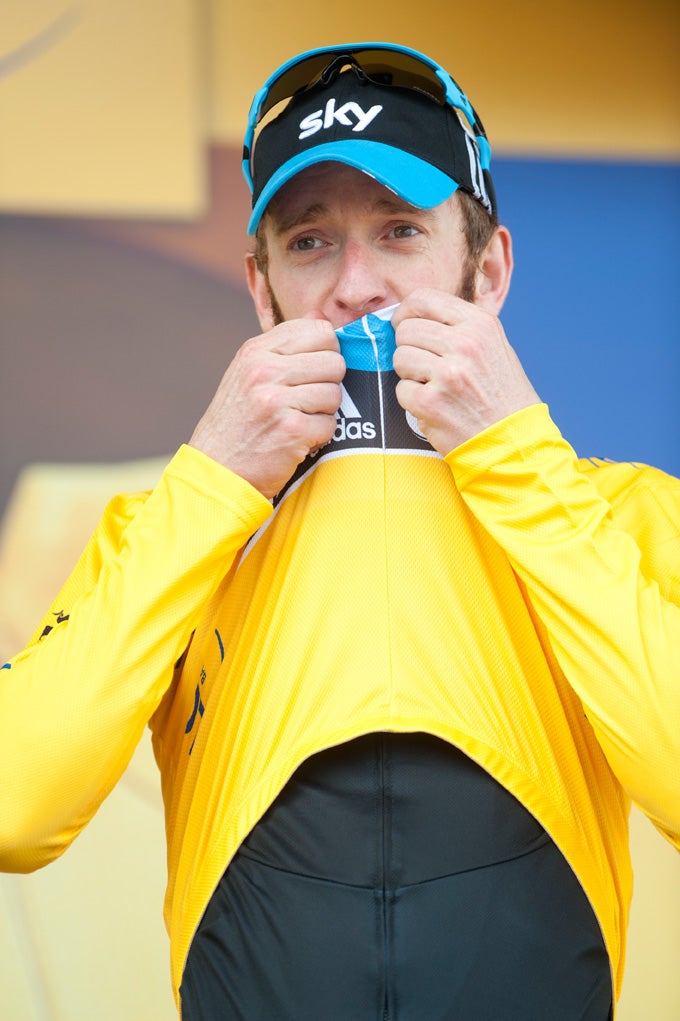On the threshold of a dream: Bradley Wiggins has chased the Tour since age 12

Bradley Wiggins savors the yellow jersey. Photo: Casey B. Gibson | <a href="http://www.cbgphoto.com">www.cbgphoto.com</a>
CHARTRES, France (AFP) — An emotional Bradley Wiggins’ childhood dream is about to come true as he prepares to ride onto the Champs-Élysées as the first Briton to win the Tour de France.
In a campaign that was reminiscent of his hero, the legendary Miguel Indurain, Wiggins built his final victory on the foundation of two time-trial wins, with Team Sky providing crucial support in the mountain stages in between.
A year after crashing out of the race with a broken collarbone, and three years after underlining his yellow-jersey potential with a fourth-place finish, Wiggins was finding it hard to come to terms with his achievement.
“Everyone says it’s a dream come true but it’s what I’ve been aspiring to do for the past few years, and even since I was a child — when I was 12 years old I said I wanted to win the Tour de France,” said Wiggins.
“No one really imagines, at that age, that it’s possible. Here I am 20-odd years on and it’s a reality now.”
After injury took him out of last year’s Tour on stage 7, Wiggins came into this year’s edition determined to make amends.
He took 10 seconds off defending champion Cadel Evans in the prologue time trial, won by RadioShack-Nissan’s Fabian Cancellara, then took a whopping 1:43 off the Australian in the stage-9 time trial.
In the mountain stages, where rivals such as Evans and Vicenzo Nibali (Liquigas-Cannondale) hoped to use their attacking prowess to dent Wiggins’ armor, Sky simply proved too strong.
The British team came to the Tour with a group of climbers who had trained together at high altitude and knew, thanks to experience and a methodical approach that had seen them exploiting the “marginal gains,” that attacks would not get far.
This led to a controlled and at times subdued race that probably did little to attract new fans. But Wiggins believes it showed the sport is far cleaner than it used to be.
“When we were riding on the front at 450 watts or whatever, someone would attack and Mick Rogers would say, ‘Just leave him, he can’t sustain it,'” Wiggins said.
“Someone is going to have to sustain 500 watts over 20 minutes of a climb to stay away, which is not possible anymore unless you’ve got a couple of extra liters of blood. That’s the reality of it. It really is. It’s all these small little percentages that make the difference in sport.”
On the race, Sky’s professionalism was evident to every other team.
Thomas Voeckler, who took the King of the Mountains title and finished fourth overall riding with his modest Europcar team, said Sky “designed their team around the demands of the race route.”
“They’ve got a really big annual budget which is more than triple ours,” added Voeckler.
“Some people might say their victory was without style and panache but you can’t argue with the fact they’ve finished first and second. Hats off to them.”
Having sat at home last year with his broken collarbone and watched the joy a Tour win can bring, Wiggins said he came back doubly determined to win this year.
“I think you need those disappointments to make you stronger,” he said. “2010 was a disastrous Tour, really, in every way, in the way I handled myself and everything. It’s those things that make you or break you.
“Then crashing out last year, sitting at home watching Cadel in Grenoble win the Tour and seeing the sense of what he was going through, that was sort of my motivation. I wanted to feel what he was feeling.”